Company details for:
HD Services Ltd

Thorne Barton Farm,
Chesham Road,
Chesham,
Buckinghamshire,
HP5 3PQ,
United Kingdom
Quick Links:
Products / Services
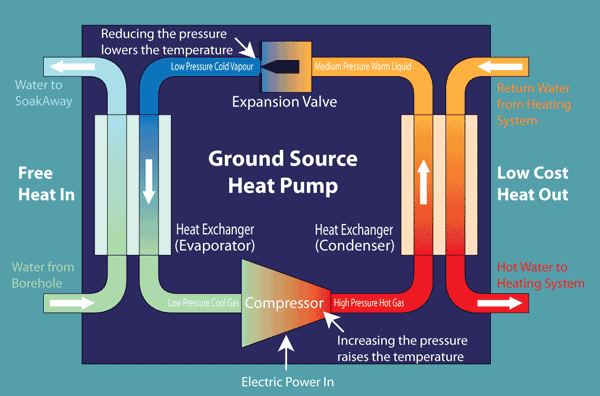
How Do GSHP’s Work?
Heat Pumps use refrigerant gases and a compressor to absorb heat from the ground or ground water. This in turn delivers heat to the target building. A heat exchanger, called an evaporator, is used to interface between the fluid from the buried pipes and the heat pump. GSHP systems use the gained energy to heat another fluid − usually water − via another heat exchanger, called a condenser. This can be used to distribute the heat (at ~40-65ºC) in a building and return it to the heat pump at about 35ºC.
The efficiency or SCOP (Seasonal coefficient of performance) is very much dependent on the temperature of a heat source and the output temperature of the heat pump. The higher the heat source temperature and the lower the output temperature of a heat pump, the better efficiency. Most modern GSHP’s can achieve SCOP’s of 4 or more, with the best performing being able to achieve around 6 if used efficiently.
Applications
GSHPs are commonly used for space heating utilising water as a distribution medium. Radiators can be used to deliver heat into the space; however, they are particularly suitable and most efficient for low-temperature distribution systems such as under-floor heating.
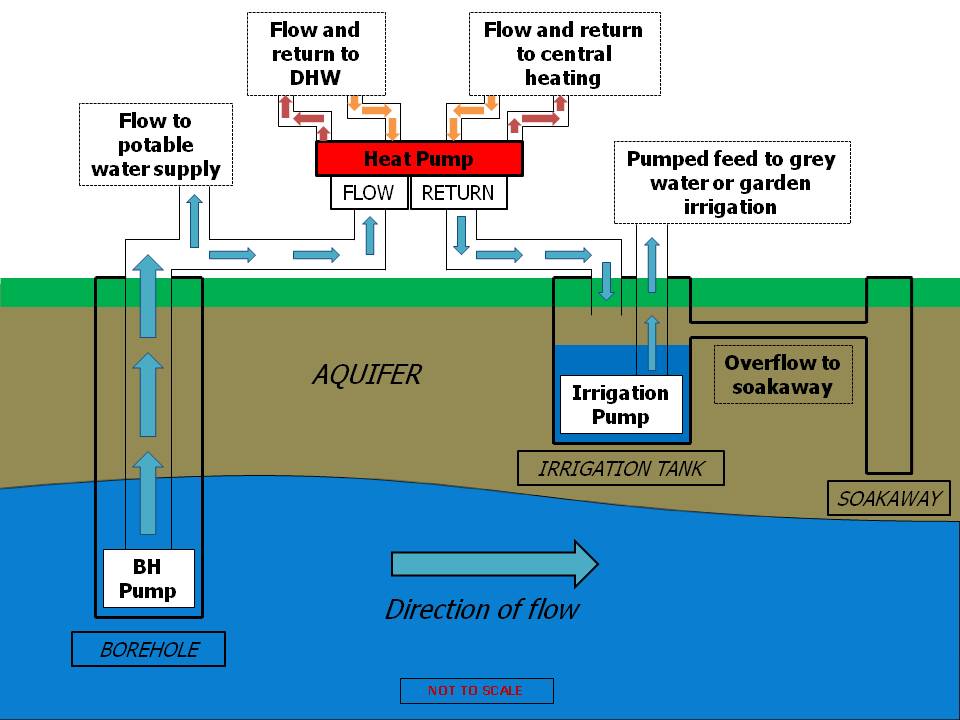
Open-Loop GSHP Installations
- Meet all your heating needs
- Meet all your water needs (subject to analysis and suitable filtration)
- Provide an additional grey water supply
and all at a fraction of the running cost of a conventional gas boiler.
How do they do that?
The Earth continually absorbs heat from the sun and stores it in the ground, below the Earths surface. At depths below 1 metre, the ground temperature is consistently between 8°C and 14°C. A ground source heat pump is designed to use this constantly renewed energy to supply domestic heating and hot water.
With an Open-Loop installation, a water supply borehole would be drilled and water at a temperature of around 11°C pumped into the building, where flow could be diverted to feed both a potable (drinkable) water supply and an open-loop heat pump. The heat pump extracts heat from the water and uses it to raise the temperature of water being circulated throughout the house. There are usually two separate water circuits, one for space heating up to 55 °C and another for domestic hot water up to 65°C.
Cooled water at around 6°C is directed from the heat pump back into the ground, where the ground temperature warms the water back up. A harvesting tank can be installed to store the discharge from the heat pump, thereby providing a water supply for garden irrigation or other ‘grey-water’ use. Unlike rain water harvesting tanks that are only replenished when it rains, a heat pump harvesting tank is replenished whenever the heat pump is in operation. If the harvesting tank is buried in the ground, the water starts to reclaim heat immediately.
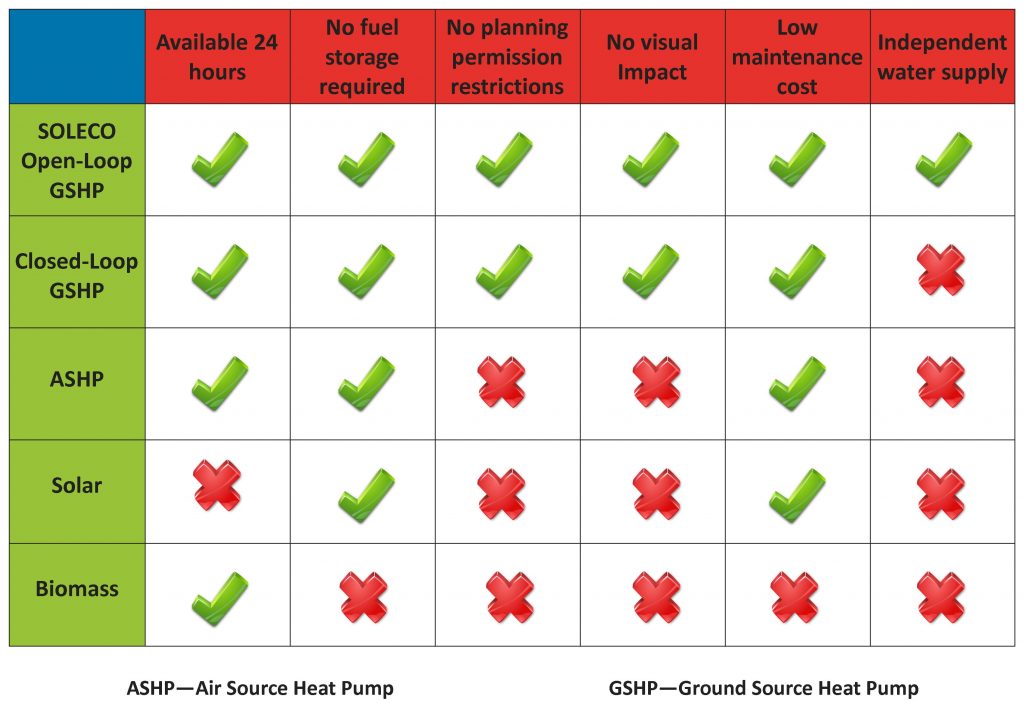
Benefits of Open-Loop Systems
- Lower running costs − The heat pumps have a high (CoP) meaning lower running costs in comparison to other heat pump technologies.
- Reduced rate VAT − 5% VAT is charged on the installation of Ground Source Heat Pumps.
- Independent Water Supply − because of an independent water supply, mains water may not be required.
- Renewable Heat Incentive (RHI) − eligible installations could receive financial support from the government subsidised RHI.
General benefits include:
- Hot water up to 65°C all year round − The heat pump can provide a constant hot water suppply without affecting power consumption or efficiency.
- All water needs are met − water could be filtered for drinking (subject to analysis) and the discharge could be used for garden irrigation and other uses.
- Minimal visual impact to your property and garden − Just a manhole cover for borehole access. The heat pump is no bigger than a large fridge.
- Compatible with low temperature radiators and under floor heating
- MCS Accredited − H.D. Services Ltd and the heat pumps we install are MCS accredited.
- National Support Network − MCS hold a national list of approved and accredited installers.
- High system efficiency throughout the year − Due to constant underground water temperatures high efficiencies can be maintained all year.
- Reduced CO2 − The heat pumps we install produce less CO2 than even the most efficient condensing gas boiler.
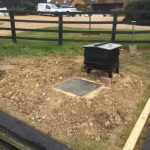
Sewage Treatment Systems
A sewage treatment systems does not have to be obtrusive or unattractive. The HD-SM Biological Filter is installed flush with the ground and can be hidden or disguised in a variety of ways. With mechanical and electrical parts housed outside of the tank in ‘beehives’ or kiosks, not only are HD-SM systems easy to service, the likelihood of wear on parts is minimised as they are not stored in the corrosive environment within the tank.
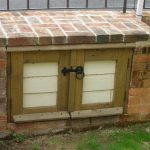
Servicing
Our servicing contracts allow for:
- Analysis of discharge to ensure compliance with design standard (BOD:SS:NH4)
- Inspection of blowers with replacement of air filters and diaphragms
- Measurement of recycle rate with adjustments as required
- Purging of aeration pipe work using a ‘water-ram’/cleaning airlift pipe work
- Overseeing de-sludging (by others) and pressure washing tank and media
- Pumping bio-zone and clarifier sludge to primary tank and refilling with water provided
- Submission of a written report with recommendations as appropriate
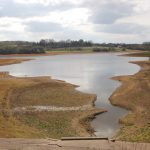
Water Supply Boreholes
At the same time, ground-water levels beneath London were rising and threatening to flood the underground. Thames Water were pumping millions of gallons of water from beneath London into the River Thames every day to keep the rising water levels down.
These two facts appear to contradict each other, however it should be remembered that many of our public water supply boreholes in the south east are situated along chalk river valleys. During a drought, the rivers are not fed as usual and neither are the reservoirs. Pumping from the public water supply boreholes is therefore increased and this adds to the plight of our rivers by reducing the groundwater levels.
Hosepipe bans are designed to reduce the demand on our water resources to prevent our rivers and reservoirs from drying up. Another way of reducing the demand on our public water supply boreholes is for individuals to abstract water from beneath their own site. The total amount of water used will not increase but the demand on the public water supplies could be greatly reduced.
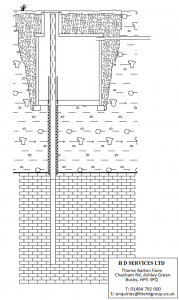
Soakaways
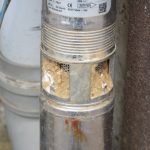
Borehole Development
At H.D. Services we utilise three different types of development − airlifting; acidisation and BoreSaver. This page attempts to explain the principals behind them and in which conditions each should be used.
AIRLIFTING: This technique is usually used when debris finds its way into the borehole and results in sediment being pulled through the borehole pumps etc.
ACIDISATION: This technique is used to facilitate the removal of soft material from within a chalk borehole and to open fissures in the chalk by using hydrochloric acid. This process increases the flow rate of the borehole by allowing more water from the aquifer to enter the borehole.
BORESAVER: BoreSaver was developed by Aquabiotics Industrial and is approved for use in private water supplies − including those used for drinking water − by the Secretary of State in the UK.
About us
Sewage Treatment Systems
Ground Source Heat Pumps
Water Supply and Soakaway Boreholes
SEWAGE TREATMENT:
Since 1984 H.D. Services has been developing sewage treatment systems culminating with the introduction of their HD-SM in 1994. Over the years we have installed hundreds of HD-SM sewage treatment systems throughout southeast England serving thousands of people.
Our unique modus operandi covers design, supply, installation, commissioning, and servicing. We do not employ agents to sell or install our systems and can take full responsibility for ensuring the discharge complies with the consent issued by the Environment Agency.
GROUND SOURCE HEAT PUMPS:
H.D. Geothermal is part of H.D. Services Ltd, a fully MCS accredited company. We aim to provide the highest quality Open-Loop Ground Source Heat Pump service available in South East England. Our customers can rely on our advice and flexibility to suit their individual requirements and we associate ourselves with suppliers who adopt a similar ethos. H.D. Services Ltd is committed to completing contracts on time and use only directly employed labour.
DRILLING SERVICES:
H.D. Services Ltd. has been constructing water supply and soakaway boreholes in the South East of England since 1984. We have been members of the Well Drillers Association (WDA) since 1988 and have a vast knowledge of the hydro-geology. This means that we can generally confirm the feasibility of a proposed installation upon receipt of a site postcode.
We aim to provide the highest quality, percussion-drilled water supply borehole service available. Our clients depend on our advice and flexibility to suit their individual requirements and we in turn associate ourselves with only those suppliers that have a similar ethos. We are committed to completing contracts on time, using only directly employed labour and our own modern plant.
All drilling works associated with our renewable heating installations and sewage treatment systems are carried out in-house. An initial telephone call to our offices will result in the receipt of a budget proposal with prices for consideration at your leisure. Our engineers can visit the site, free of charge and without obligation, to assess and measure the site.
H.D. Services Ltd are BS EN ISO 9001 and BS EN ISO 14001 certified
PRODUCTS AND SERVICES
Sewage Consultants Services
Sewage Consultants' Equipment & Supplies
Tank Work & Tank Cleaning
Wellborers & Sinkers' Services
Ground Source Heat Pumps
Images






























Articles / Press Releases
Brochures
Reviews
Trade Associations







